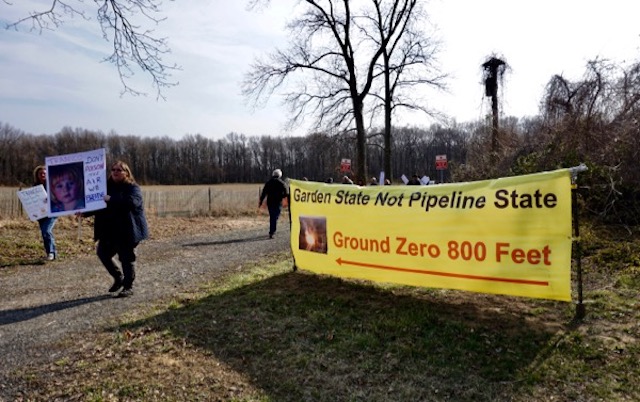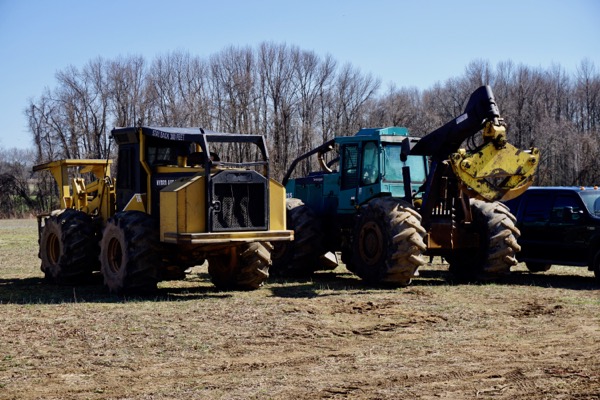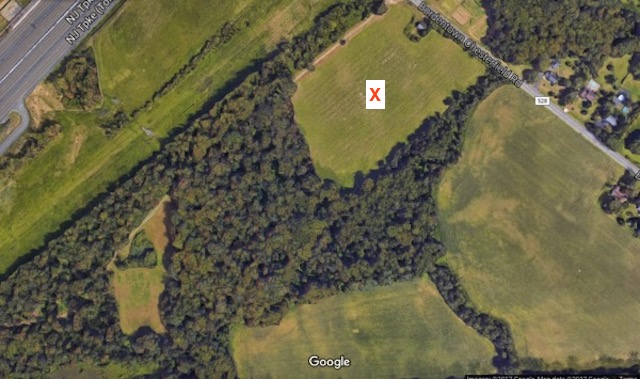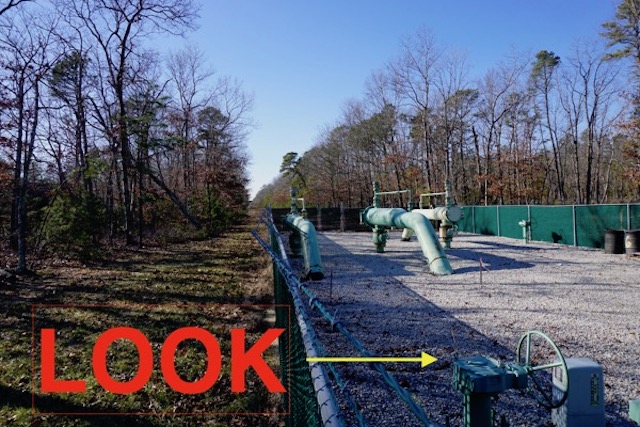Pinelands Commission Denies Request to Stay Pipeline Construction Pending Court Appeals
NJ Natural Gas SRL Pipeline Next In Line
Climate catastrophe buried under the rubble of pipeline lies
[Update below – Order based on fact error!]
The trite saying goes: if you’re in a hole, it’s best to stop digging.
Go tell that on the Pinelands Commission, who today dished out even more shovels seemingly in search of bedrock.
After being rebuked by the NJ Appellate Division for violating the Pinelands Act and CMP as a result, in part, of allowing their Executive Director to run roughshod over them and publicly blasted by 4 former Governors and a former Executive Director, major NJ newspaper Editorial Boards, massive protests, and over 6,000 critical public comments, one would think the Commission would be humble and proceed deliberatively.
One would be wrong.
Instead, the Commission denied a request by the Pinelands Preservation Alliance (PPA) to stay construction of the controversial South Jersey Gas pipeline approved by the Commission on February 24, 2017 pending the outcome of the PPA’s legal challenge.
Adding insult to injury, in doing so, the Commission repeated past abuses by adjourning into secret executive session and then rubber stamping a previously drafted Order and Resolution, all before any opportunity for the public to review the draft Order and Resolution and comment to the Commission on the matter before they voted.
Commissioner Lohbauer opposed the Resolution and he spoke out to agree that PPA’s stay request was valid. Lohbauer agreed with PPA’s claims that – should the SJG pipeline commence construction – 1) the Pinelands would suffer irreparable harm, particularly due to risks to surface and groundwaters; 2) that the Commission violated the due process rights of the public and the Pinelands Protection Act and Administrative Procedures Act by excluding many people from testifying and failure to amend the CMP in response to the Court’s remand prior to voting; and 3) that the underlying SJG approval issued by the Commission was flawed because the SJG pipeline did not meet the standard in the CMP that the pipeline primarily serve only the interests of the Pinelands.
Lohbauer did not agree with PPA’s claims that Commissioners had conflicts of interest.
Lohbauer’s NO vote was supported by Commissioners Ashmum, Lloyd, Prickett, and Rohan-Green. They lost by an 8-5 vote.
The Commission again got blasted by the public not only for their approval of the SJG pipeline, but for numerous other actions that undermined the public’s trust and confidence in the Commission and the integrity and independence of the Pinelands Commission and the Comprehensive Management Plan.
Commissioner Jannarone was criticized for her SLAPP suit against 14 people who submitted comments on her real estate firm’s Facebook page.
Chairman Earlen tried to stop my testimony on this topic – I refused and forcefully objected to his attempt to suppress my testimony. What a jerk.
Commissioner Barr was criticized for his press statements prior to the vote where he announced his support of the pipeline – 3 days before his colleagues were to deliberate and vote on it – and based on irrelevant and “ultra vires” factors, like job creation, local tax revenues and economic development. Barr needs to read the CMP and his sworn oath to protect the Pinelands!
Apparently, the PPA’s stay request also alleges conflicts of interest by Commissioner Chila due to his relationship with the IBEW union, who supported the pipeline aggressively and Commissioner Barr had conflicts due to his role as Treasurer of the Cape May Democratic Party, who, among other things, received IBEW contributions in support of candidates that supported the pipeline.
I explained to the Commission that NJ Ethics law is based on an “appearance” standard – all that is needed is a fact based reasonable appearance of a conflict – not an actual substantive conflict – to trigger restrictions.
During the general public comment period, I also blasted the Commission for failure to make any progress on the issue of climate change or implementation of the water restrictions recommended by the Kirkwood – Cohansey Project – or to charge applicants adequate fees to budget or fill 22 professional vacancies. I’ve written about these issues before so hit the links or do a word search if you are interested in the details.
I cited the recent USGS phenology mapping initiative as a model framework for the basic science and monitoring initiative that is long overdue to document and assess climate impacts on Pinelands ecosystems.
Emile DeVito, PhD, of NJCF reiterated the urgency to stop ongoing destruction by off road vehicles and offered some interesting testimony in support of my climate remarks, citing his research on monitoring snakes and the timing of their hibernation. He strongly recommended that regulatory timeframes designed to protect the species be revised to reflect climate impacts.
At the end of the meeting, Commissioner Lohbauer thanked the public for excellent testimony and he went out of his way to agree with me that climate change needs to be addressed. Now how ironic is that?
Commissioner Avery, after being called out for his misleading and false comments about a recent PJM Order related to the BL England plant (more forthcoming on that issue), then responded to some public criticism about his vote and claimed the CMP does not have “standards” to address climate change.
I explained to him after the meeting about the difference between “numeric standards” and “narrative standards”.
The CMP is loaded with narrative standards that require the application of the best available science, best professional judgement by the experts, and the exercise of discretion by the Commissioners within the scope of the Pinelands Act.
The “equivalent ecological protection” standard the Commission applied to the SJG MOA is just one notorious “narrative standard” – that is one among hundreds in the CMP.
[Update: 4/12/17 – In case refers of Avery don’t quit understand, the NY DEC denial of a Water Quality Certificate for a proposed pipeline turned on “narrative standards” ~~~ end update]
Avery is a hypocritcal slippery snake – a man with enough knowledge to plausibly lie.
Chairman Earlen left early, but not before apologizing to Commissioners Barr and Jannarone and Executive Director Wittenberg for the alleged threats they received from pipeline opponents.
What a crock of Bullshit: Jannarone is abusing the legal process to intimidate critics and suppress their free speech rights.
Chairman Earlen – and others like Senator Van Drew – are seeking to criminalize free speech and dissent by equating it with harassment and threats. Thus the 3 State Police officers present at a routine and civil meeting.
My goodness, even the NY Times – no radical rag – gets it. Add the Gov. Christie [R] Pinelands Commission to this growing list:
All for now – the NJNG SRL is the next pipeline coming down the pike.
Will the Commission stop digging?
We doubt it.
[Update: I just read the Order adopted by the Commission today. I must note an egregious fact error.
On page 20 of the Order it states: (boldface mine):
“In addition, the only complaint the Commission received prior to the meeting regarding the venue size mistakenly believed it could only accommodate 120 people.”
That statement is factually in error, as evidenced by the January 4, 2017 email below I submitted to Commissioner Lohbauer, which was also submitted to the Commission’s public comment website portal, which explicitly objected to a lack of “adequate capacity”, among other things:
“I demand that the Commission select a civic building with adequate capacity to allow meaningful comment.”
While this comment was submitted in the context of the initial church location, the concern about the need for “adequate capacity to provide meaningful comment” was NOT location specific.
Here is the complete email:
On January 4, 2017 at 1:29 PM Bill WOLFE <bill_wolfe@comcast.net> wrote:Commissioner Lohbauer:
I just submitted the comment below to the Commission’s website. I urge you to intervene and remedy this situation.
Dear Commission:
I just received your email advising me of a change in location for the scheduled Jan 24 public hearing.
I find it offensive to have to sit in pews and testify in a Catholic Church – as well as an inappropriate and unconstitutional state endorsement of a specific religion.
I demand that the Commission select a civic building with adequate capacity to allow meaningful comment.
Additionally, the change in location would require additional public notice.
Bill Wolfe
Additionally, I blogged about and documented this issue and concern in a on January 14, 2017 post at Wolfenotes, see:
More to follow. ~~~ end update]




